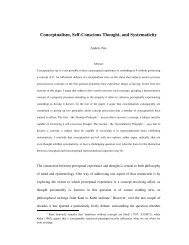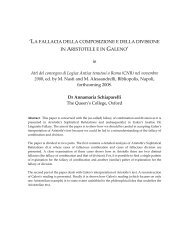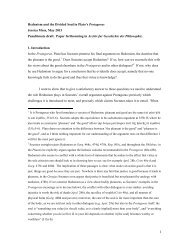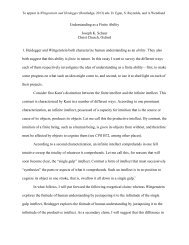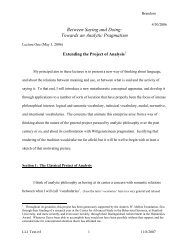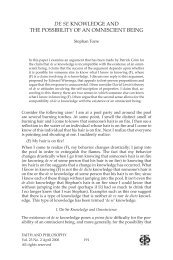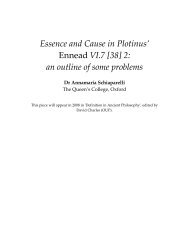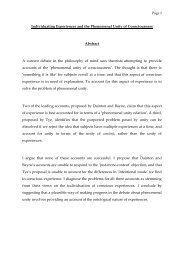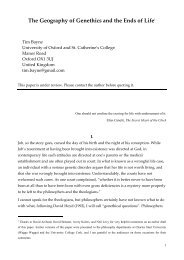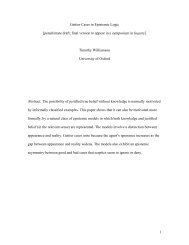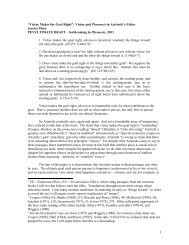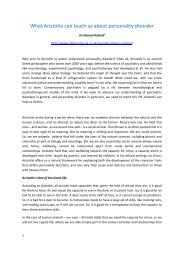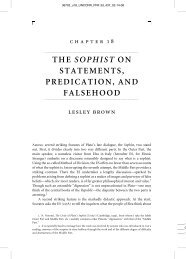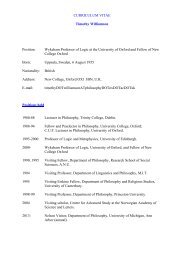Say who everyone is as you go along - Faculty of Philosophy ...
Say who everyone is as you go along - Faculty of Philosophy ...
Say who everyone is as you go along - Faculty of Philosophy ...
Create successful ePaper yourself
Turn your PDF publications into a flip-book with our unique Google optimized e-Paper software.
50<br />
Nevertheless, Nietzsche does not avoid metaphysical commitments <strong>of</strong> h<strong>is</strong> own.<br />
Here 'the Self' <strong>is</strong> an ironic name for the body<br />
'Instruments and playthings are sense and spirit: behind them there <strong>is</strong> still the Self.<br />
The Self seeketh with the eyes <strong>of</strong> the senses, it harkeneth also with the ears <strong>of</strong> the<br />
spirit' (Z 36)<br />
Rather like Merleau-Ponty in Phenomenology <strong>of</strong> Perception Nietzsche depicts<br />
subjectivity <strong>as</strong> physical. The subject <strong>is</strong> that which thinks and experiences but the<br />
body <strong>is</strong> that which thinks and experiences, so the subject <strong>is</strong> the body. I am that which<br />
h<strong>as</strong> my thoughts and experiences, but my body h<strong>as</strong> my thoughts and experiences, so I<br />
am my body. If there <strong>is</strong> a semi-elusive self that <strong>is</strong> the perennial subject <strong>of</strong> my<br />
experiences, it <strong>is</strong> my body:<br />
'Ever hearkeneth the Self, and seeketh; it compareth, m<strong>as</strong>tereth, conquereth, and<br />
destroyeth. It ruleth, and <strong>is</strong> also the e<strong>go</strong>'s ruler' (Z 36)<br />
Nietzsche does not use the word 'brain' in the following p<strong>as</strong>sage, and it may plausibly<br />
be read <strong>as</strong> about the body <strong>as</strong> a <strong>who</strong>le. Nevertheless, if we note that the brain <strong>is</strong> not<br />
usually the direct object <strong>of</strong> its own experiences and so in that sense 'unknown', or<br />
hidden, then we may read Nietzsche <strong>as</strong> claiming that the brain <strong>is</strong> the elusive self:<br />
'Behind thy thoughts and feelings, my brother, there <strong>is</strong> a mighty lord, an unknown<br />
sage - it <strong>is</strong> called Self; it dwelleth in thy body, it <strong>is</strong> thy body' (Z 36)<br />
and<br />
'Thy Self laugheth at thine e<strong>go</strong>, and its proud prancings' (Z 36)<br />
The brain <strong>is</strong> in the body and the brain <strong>is</strong> part <strong>of</strong> the body and <strong>is</strong> arguably the best<br />
non-metaphysical candidate for the 'unknown sage'. Taken with h<strong>is</strong> earlier claims, we<br />
may read Nietzsche <strong>as</strong> saying that I am not my e<strong>go</strong>, I am not my soul. I am my brain.<br />
Pain and the Self<br />
The essential aim <strong>of</strong> Buddh<strong>is</strong>m <strong>is</strong> life without suffering. Buddh<strong>is</strong>m recogn<strong>is</strong>es three<br />
sources <strong>of</strong> suffering: natural calamities, such <strong>as</strong> floods and earthquakes, the actions<br />
<strong>of</strong> other people, and the thoughts in one's own mind. Of these three, the l<strong>as</strong>t <strong>is</strong><br />
overwhelmingly the greatest source <strong>of</strong> suffering. It <strong>is</strong> also the most eliminable. Its<br />
negative emotional power <strong>is</strong> intimately bound up with the sense <strong>of</strong> self.<br />
The Buddh<strong>is</strong>t term that <strong>is</strong> translated 'suffering', dukkha, h<strong>as</strong> the sense not only <strong>of</strong><br />
physical and emotional pain but also 'mala<strong>is</strong>e' or 'd<strong>is</strong>sat<strong>is</strong>faction'. I suggest dukkha <strong>is</strong><br />
most accurately rendered into a European language by the ex<strong>is</strong>tential<strong>is</strong>t terms Angst,



